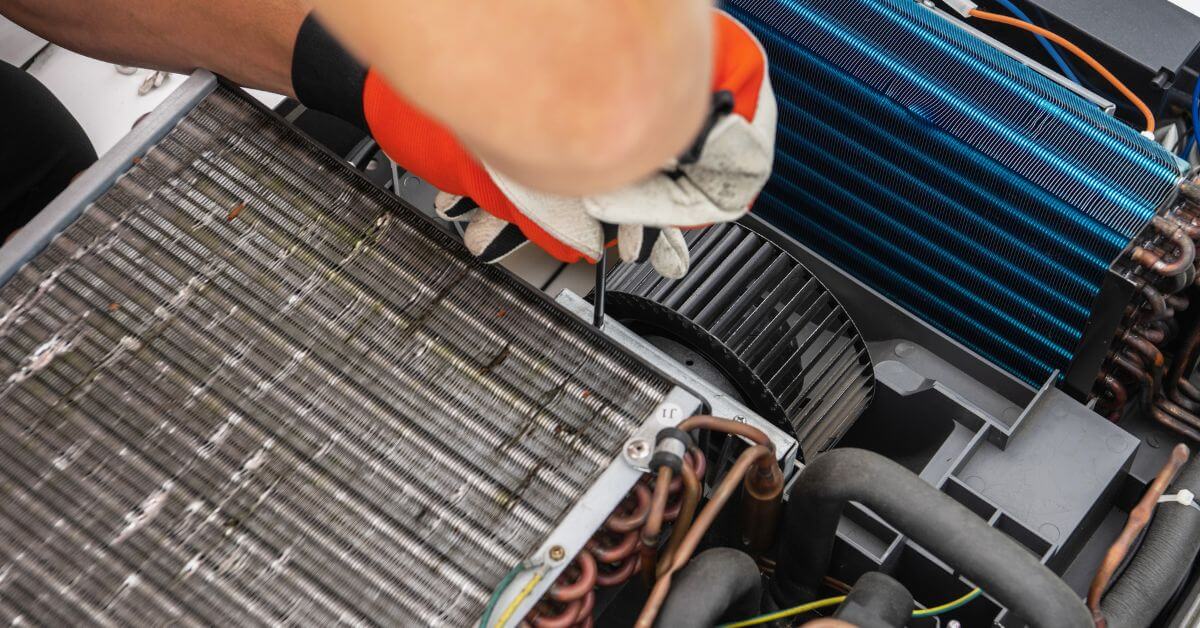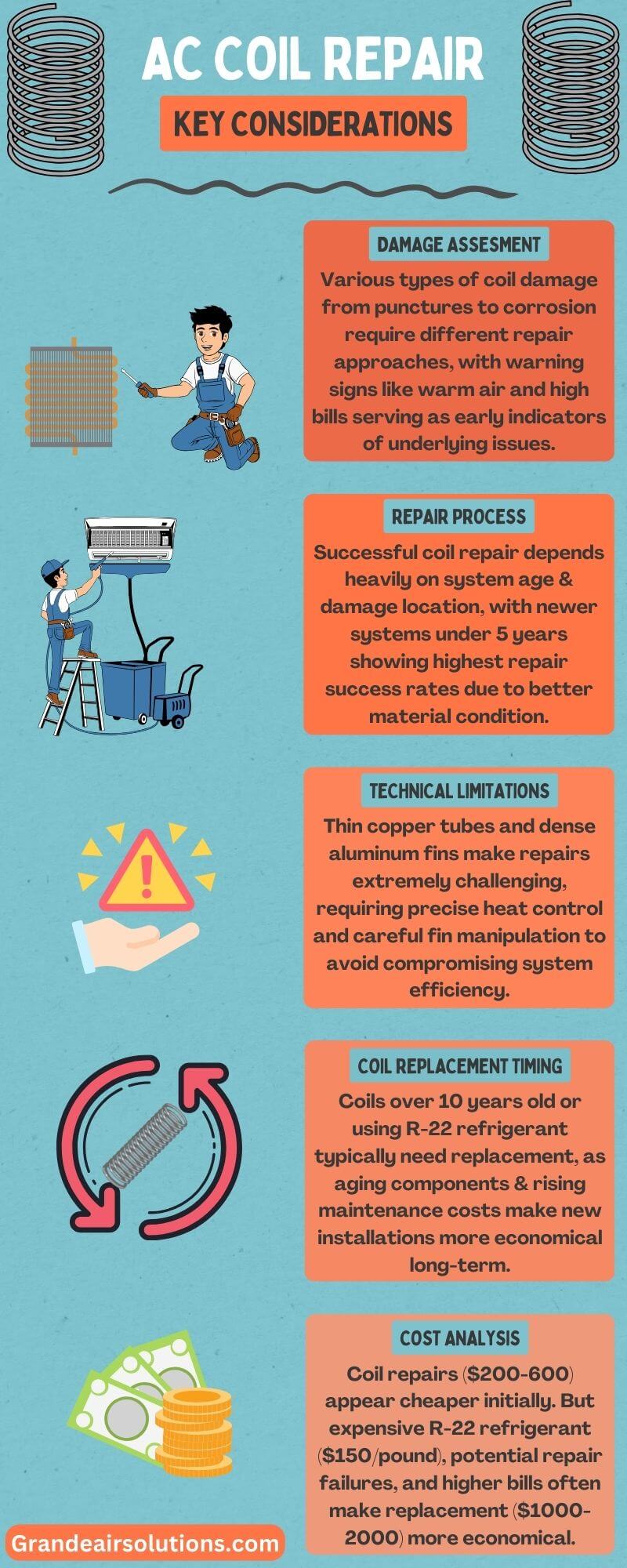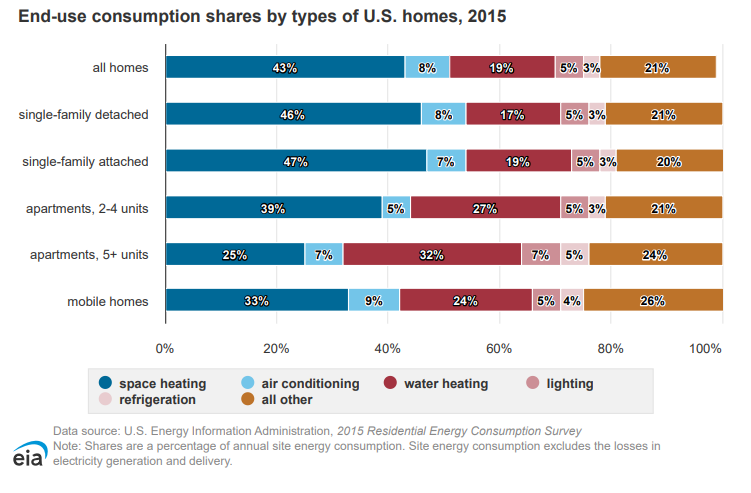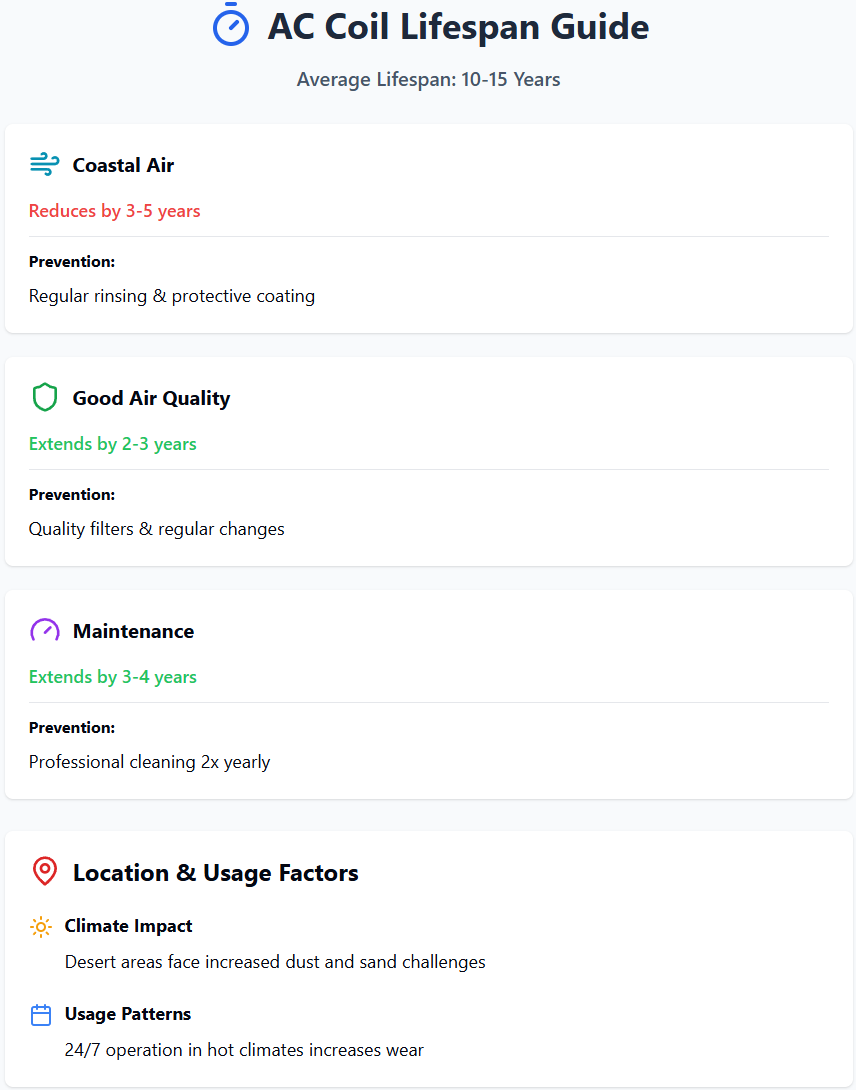
As per research, alloy steel, titanium, and stainless steel coils are the most durable AC coils used in modern AC coils. However, even these can get damaged over time and may need necessary AC repair to make your Austin home comfortable again. But the question is, is it possible to get repairs? Let’s find out:
AC coil repairs are possible, but success depends heavily on the type of damage and how far it's spread. Small, localized issues like a single puncture might be fixable, while widespread damage usually means replacement is your best bet.
Think of it like fixing a car or a recreational vehicle—a small dent is repairable, but major body damage requires replacement parts.

Your AC coils can get damaged in several ways, and each type of damage needs different fixes.
Coil damage usually happens slowly over time, but sometimes it can occur suddenly. Here's what typically goes wrong with AC coils:
Damage Type | Common Causes | Prevention Tips |
Puncture Holes | DIY repairs, careless maintenance | Always hire licensed technicians |
Corrosion | Salty air, chemical cleaners | Regular cleaning, avoiding harsh chemicals |
Water Issues | Poor drainage, high humidity, mineral deposits (especially from central Texas lakes) | Keep drain lines clear, and check regularly |
When screws or drills accidentally hit your coils, they create holes that leak refrigerant. You'd be surprised how often this happens during DIY repairs. These punctures are like getting a flat tire - they need immediate attention.
Corrosion is sneaky. It starts small but spreads fast, especially if you live near the ocean. The salty air eats away at your coils like rust on an old car. Once corrosion starts, it's hard to stop.
Water problems happen when your AC can't drain properly. Think of it like a clogged sink - the water has nowhere to go. This standing water leads to mold and damage inside your system.
Your AC will tell you when something's wrong with its coils. You just need to know what to look for:
Warm air coming from your vents is your first sign something's wrong. If your AC is running but not cooling, your coils might be the problem. Bad smells are another red flag. That musty odor means there's probably mold growing in there.
When your coils freeze up, it's usually because they're either dirty or low on refrigerant. Frozen coils can't do their job properly, and breathing through a stuffy nose is like breathing through a stuffy nose—the air just can't get through.
Warning Sign | What It Usually Means |
System Short Cycling | The coil can't maintain the proper temperature |
High Energy Bills | The system working harder than normal |
Unusual Noises | Refrigerant leaking or components loose |
If your system turns on and off quickly, that's called short cycling. This usually means your coils aren't working efficiently.
Keep an eye on your utility bills, too. When coils are damaged, your system works harder and uses more electricity. You might notice your bills climbing even though you haven't changed how you use your AC. Since heating and cooling use 52% of a home’s energy, you’ll easily notice any changes in energy bills if they’re from HVAC.

HVAC technicians can often fix coil problems in certain spots. The best chances for repair are when the damage is easy to reach, like where tubes connect or where panels join together. You'd be surprised how many coil repairs happen because of accidental screw punctures during routine maintenance.
Age of System | Repair Success Rate | Common Repair Locations |
Under 5 years | High | Tube sheets, brazed joints, U-bends |
5-10 years | Moderate | Accessible connections, surface damage |
Over 10 years | Low | Limited repair options |
Newer AC systems respond better to repairs. When your coils are under 10 years old, they're less likely to have other hidden problems. The copper tubes are usually still in decent shape, making repairs more reliable.
Location matters, too. Technicians look for clear access to the damaged spot and check if the surrounding copper looks healthy without any rust or wear. It's like fixing a tire—you need good rubber around the puncture for the patch to hold.
The process starts with serious cleaning. Technicians use special scrubbing pads to make the metal spotless. They also run nitrogen through the system while cleaning to keep dirt from getting inside.
Repair Step | Critical Tools | Common Mistakes to Avoid |
Surface Prep | Scotch-Brite pads, nitrogen | Skipping thorough cleaning |
Brazing | #2 torch tip, 15% silver solder | Using too much heat |
Testing | Pressure gauge, leak detector | Rushing system restart |
The actual repair uses brazing—it's like super-strong soldering. Technicians use a special torch with a small tip. They have to be really careful with the heat. Too much can damage the thin copper tubes, but too little won't create a strong bond.
Good technicians use specific materials for the job. They pick 15% silver solder because it flows well and creates strong joints. They carefully move the torch, heating the spot enough without overdoing it. It's precise work that takes experience to get right.
After repairs, testing is crucial. The system needs proper pressure checks and leak tests before adding refrigerant. Rush jobs often lead to callbacks, so reputable technicians take their time to ensure everything's perfect.
The biggest hurdle is how AC coils are built. The copper tubes in these coils are incredibly thin—way thinner than regular copper pipes.
Even HVAC pros who fix pipes all day long sometimes struggle with coil repairs. The heat control needs to be super precise. Too much heat for even a split second can melt right through the tube.
Another big problem arises when fixing leaks deep in the coil. Those aluminum fins that make your AC work efficiently? Technicians often need to remove some to reduce the damage. But here's the catch—take away too many fins, and your AC won't cool as well anymore.
It's not always easy to decide between repairing and replacing AC coils. Let's explore how age, refrigerant type, and costs affect this important decision.
Your AC system's age is one of the biggest factors in this decision. HVAC professionals consistently point to the 10-year mark as a crucial turning point. After a decade of service, AC systems start showing their age in ways that make repairs less practical.
System Feature | Repair Outlook | Replacement Recommendation |
Under 10 years old | Generally worth attempting | Only if multiple leaks present |
Over 10 years old | High risk of failure | Strongly recommended |
Using R-22 refrigerant | Increasingly expensive | Yes, due to the refrigerant phase-out |
The type of refrigerant your system uses matters more than ever now. R-22, the old standard refrigerant, is being phased out. Finding it gets harder and more expensive every year. Newer systems use R-410A, which runs at higher pressures and needs stronger components.
Multiple leaks or visible rust spots tell an important story. They're like warning signs that your whole system is wearing down. New coils come with 10-year warranties, offering peace of mind that repairs just can't match.
The money math gets interesting when you look at the whole picture. R-22 refrigerant alone costs over $150 per pound nowadays. Most systems need between 6 and 20 pounds. That adds up fast when you're refilling after repairs.
Expense Type | Repair Scenario | Replacement Scenario |
Initial Cost | $200-600 + refrigerant | $1000-2000 installed |
R-22 Refrigerant | $150+ per pound | Not needed (new system) |
Labor Costs | May need multiple visits | One-time installation |
Failed repairs hit your wallet twice. You pay for the first attempt, then again for replacement when it doesn't work. Smart HVAC techs often suggest putting repair money toward a new system instead. It's like avoiding throwing good money after bad.
Think about hidden costs, too. Every time your AC isn't working right, your electric bills climb. Emergency service calls aren't cheap, especially when they happen repeatedly. A new coil might cost more upfront but saves money over time.
Warranty coverage changes everything in this equation. New coils typically come with 10-year warranties, protecting your investment. Repairs on old systems offer no such safety net. Each service call comes straight from your pocket.
Before deciding, add up all potential costs. Include refrigerant, labor, possible future repairs, and higher utility bills. Sometimes, the "cheaper" repair option ends up costing more in the long run.
AC coils typically last between 10 to 15 years when properly maintained. However, several factors can either shorten or extend this lifespan. Let's break down what affects your coil's longevity.
Environmental Factor | Impact on Lifespan | Prevention Tips |
Coastal Air | Reduces by 3-5 years | Regular rinsing, protective coating |
Good Indoor Air Quality | Can extend 2-3 years | Use quality air filters, regular changes |
Right Maintenance Schedule | Can extend 3-4 years | Professional cleaning twice yearly |
Your location plays a huge role in coil longevity. Living near the ocean? Those salty breezes can cut years off your coil's life, but that’s not a problem in Texas unless you live in beach towns such as Galveston or Rockport. Desert dwellers face different challenges - all that dust and sand can clog coils faster than you'd expect.

Usage patterns matter, too. Running your AC 24/7 in hot climates puts extra stress on those coils. Most coils in moderate climates with regular maintenance hit their teen years without major issues.
Professional HVAC technicians recommend cleaning your AC coils at least once yearly, but some situations call for more frequent cleaning. Knowing your specific needs can save you money and prevent system failures.
Usage Type | Recommended Cleaning Frequency | Warning Signs Needed |
Residential Light Use | Once per year | Visible dirt, reduced cooling |
Heavy Use/Pets | Twice per year | Higher energy bills, dust buildup |
Commercial/Industrial | Quarterly | Performance drops, strange sounds |
The cleaning schedule depends on your environment and system usage. Homes with pets or nearby construction might need cleaning every six months. Dusty areas or properties near busy roads often require more frequent attention.
Regular cleaning prevents several common AC problems. Clean coils transfer heat better, which means your system works less hard, lowering energy bills and fewer repair calls. Most homeowners save enough on electricity to offset professional cleaning costs.
Whether it is corrosion, leakage, puncture, or any other kind of AC coil damage, it's always worth an inspection by a professional before you decide whether to repair or replace it.
Our HVAC technicians are well-versed in detecting and fixing all major HVAC issues, including coil problems. So call (512) 677-4424, schedule a visit, and let us help you find the best possible and affordable solution for your AC coil troubles.
